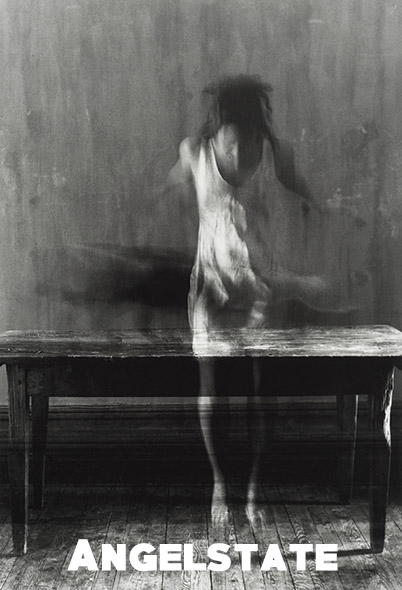
Disciplined Bodies…
Repression and desire in Nina Rapi’s Angelstate
by George Sabatakakis (Senior Lecturer in Drama, Patras University)
Nina Rapi belongs to a new generation of Greek dramatists which defends a more politically aware kind of writing that doesn’t focus on national customs and morals (i.e. doesn’t limit itself to a localised microcosm) but defamiliarises, making strange, expanding situations into paradigmatic dramaturgical circumstances/conditions thus sending a universal message in defence of reconstituting the dominant structures of normality. And Angelstate is a study of the social divisions of discipline and repression of desire.
In an imaginary space of expiation, punishment and mainly self-punishment six characters, under strict surveillance, retrace their stories and their ‘sins’ which are all related to the expression of desire. Specifically, the typology of the characters of the play (Bodyguard, Bodybuilder, Anorexic, Dominatrix, the Priest) which makes them paradigramic but not unhistorical, is connected to general kinds of repression or self-willed control of a bodily desire but also to the expulsion from the assumed normal (body).
The condition within which these characters are placed, angel-state, is an existential condition of «being», which is transformed dramaturgically into an ambiguous, border space of an existential state of suspension (a laboratory-prison cum Purgatory, where the characters of the play act confessionally under the constantly watchful eye of the controlling authorities which historically produce obedient bodies and entrenchment [1]). As a result, these types become dramaturgical beings, reliving their endogenous weaknessess and contradictions (always in connection with a social rule) way beyond the everyday. Angel-state is primarily a situation of coming-into-being/self-realisation, but also of a reconstitution of the boundaries of desire for those willing to perform the transition to a new personal structure (of exoneration and refusal of previous guilt).
All the characters denounce or even create a rupture in the social norms of relationships. All the characters have been involved in a power relation within which they found themselves either in the position of perpetrator/server or victim/receiver. All the characters of the play have a relationship of either delivering or receiving pain or even «evil». The Missionary has as his duty to impose evil, the Body Builder is subjected to fatherly «punishments» in the context of love, the Bodyguard accepts the loss of sexual love deterministically, the Priest deviates and is erotically drawn to someone who is beyond ethical bounds for his conscience.
Only the Dominatrix defends her actions to the end: «And what does love mean? To want to give pleasure more than to receive it. This is love, I suppose.» The sadistic subject, a representation of legitimate female imposition, is not only a constant form of female dominance but also an allegory for social relations. Sadomasochism, is after all a theatre of sexual desire, linked not only to pain itself, but to the eroticisation of the desire for pain, and pleasure as the materialisation of (socially) forbiden forces:
We choose the most terrifying, repulsive and unacceptable activities and we transform them into pleasure. We use all the forbidden symbols and all the denounced feelings […]. The basic dynamic of Sadomasochism lies in the dichotomy of power, not in pain. The handcuffs, the dog collars, the whips, the kneeling, the tying up […] and serving somebody sexually – they are all metaphors […][2], which dramatise the social inequality of those forces.
Finally, Angelstate is a subversive queer play, not because women within it desire women but mainly because it ventures to comment critically on the subject of female desire outside the centre of normality:
Queer does not define a category of already objectified pathologies or perversions; on the contrary, it describes a horizon of possibilities, the exact breadth and heterogeneous aim of which is not possible to be fixed a priori.
Occupying the eccentric positionality of the queer subject may deliver the realisation of a variety of possibilities for the reconstitution of relations between sexual behaviours, erotic identities, gender construction, kinds of knowledge, regimes of expression, logics of representation, ways of self-definition and community practices; in other words, the reorganisation of relations between power, truth and desire.[3]
The regimes of expression are changing in the new Greek Theatre and Angelstate is a ‘special verdict’ on desire.
GIORGOS SABATAKAKIS, SENIOR LECTURER IN DRAMA, UNIVERSITY OF PATRA
[1]Michel Foucault’s memorable terms in Discipline and Punish. The birth of the Prison. trans. K. Hatzidimou – I. Ralli, Rappa Publications, Athens, 1989, 181-226.
[2] Pat Califia, “Unravelling the Sexual Fringe: A Secret Side of Lesbian Sexuality”, The Advocate, 27.12.1979, 19 (19-22), όπως παρατίθεται στο: Jeffrey Weeks, “The Meaning of Diversity”, Peter M. Nardi –Beth E. Schneider (eds.), Social Perspectives in Lesbian and Gay Studies, Routledge, London and New York, 1998, 325-26 (312-33).
[3] David Halperin, Saint Foucault: Towards a Gay Hagiography, Oxford University Press, New York – Oxford, 1995, 62.
Sept. 2015
